sacraments
The Latin word sacramentum means “a sign of the sacred.” The seven sacraments are ceremonies that point to what is sacred, significant and important for Christians. They are special occasions for experiencing God’s saving presence. Sacraments are at the same time signs and instruments of God’s grace.
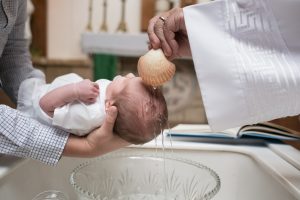
Baptism
The origin and foundation of Christian Baptism is Jesus. Before starting his public ministry, Jesus submitted himself to the baptism given by John the Baptist (Mt 3:1-17; Mk 1:1-11; Lk 3:21-24; Jn 1:30-34). The waters did not purify him; he cleansed the waters. . . . Jesus did not need to be baptized because he was totally faithful to the will of his Father and free from sin. However, he wanted to show his solidarity with human beings in order to reconcile them to the Father. By commanding his disciples to baptize all nations, he established the means by which people would die to sin – Original and actual – and begin to live a new life with God.
In Baptism, the Holy Spirit moves us to answer Christ’s call to holiness. In Baptism, we are asked to walk by the light of Christ and to trust in his wisdom. We are invited to submit our hearts to Christ with ever deeper love.
Parents need to attend a Baptism preparation class prior to having their child baptized at IC.
For adults today, the Church, after the Second Vatican Council, has restored the order of the Catechumenate in the Rite of Christian Initiation of Adults. It outlines the steps for the formation of catechumens, bringing their conversion to the faith to a greater maturity. It helps them respond more deeply to God’s gracious initiative in their lives and prepares them for union with the Church community. This process is meant to form them into the fullness of the Christian life and to become disciples of Jesus, their teacher.
Please contact the Parish Office for more information or to attend a class.
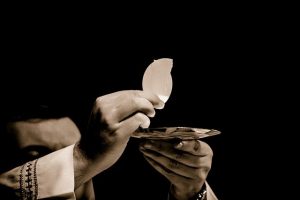
Eucharist
The Lord Jesus, on the night before he suffered on the cross, shared one last meal with his disciples. During this meal our Savior instituted the sacrament of his Body and Blood (Mt 26:26-28; cf. Mk 14:22-24, Lk 22:17-20, 1 Cor 11:23-25). He did this in order to perpetuate the sacrifice of the Cross throughout the ages and to entrust to the Church his Spouse a memorial of his death and resurrection.
Recalling these words of Jesus, the Catholic Church professes that, in the celebration of the Eucharist, bread and wine become the Body and Blood of Jesus Christ through the power of the Holy Spirit and the instrumentality of the priest. Jesus said: “I am the living bread that came down from heaven; whoever eats this bread will live forever; and the bread that I will give is my flesh for the life of the world. . . . For my flesh is true food, and my blood is true drink” (Jn 6:51-55). The whole Christ is truly present, body, blood, soul, and divinity, under the appearances of bread and wine—the glorified Christ who rose from the dead after dying for our sins. This is what the Church means when she speaks of the “Real Presence” of Christ in the Eucharist. This presence of Christ in the Eucharist is called “real” not to exclude other types of his presence as if they could not be understood as real (cf. Catechism, no. 1374). The risen Christ is present to his Church in many ways, but most especially through the sacrament of his Body and Blood.
Second graders celebrate their First Reconciliation during January. Children are prepared to recieve the sacrament by their teachers at IC grade school or througth the School of Religious Education (SRE). Parents of older children should contact the Parish Office to arrange sacramental preparation.
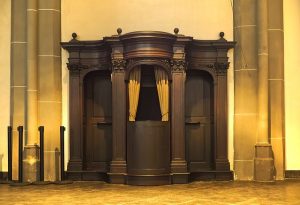
Reconciliation
Not only does the Sacrament of Reconciliation free us from our sins but it also challenges us to have the same kind of compassion and forgiveness for those who sin against us. We are liberated to be forgivers. We obtain new insight into the words of the Prayer of St. Francis: “It is in pardoning that we are pardoned.”
Jesus entrusted the ministry of reconciliation to the Church (Jn 20:20-23). The Sacrament of Penance is God’s gift to us so that any sin committed after Baptism can be forgiven. In confession we have the opportunity to repent and recover the grace of friendship with God. It is a holy moment in which we place ourselves in his presence and honestly acknowledge our sins, especially mortal sins. With absolution, we are reconciled to God and the Church. The Sacrament helps us stay close to the truth that we cannot live without God. “In him we live and move and have our being” (Acts 17:28).
Second graders receive their First Reconciliation in January or February. Children are prepared to receive the sacrament by their teachers at IC grade school or through the School of Religious Education (SRE). Parents of older children should contact the Parish Office to arrange sacramental preparation.
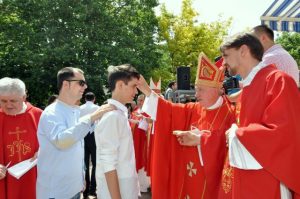
Confirmation
Although the Sacrament of Confirmation completes the Sacraments of Initiation, it does not complete faith formation. Through the anointing of the Holy Spirit in the Sacrament of Confirmation, the people of God are able to more fully participate in the life of Jesus as they continue the lifelong journey of seeking, learning, and growing in faith.
The Sacrament of Confirmation is conferred upon Catholic youth during their 9th grade year. Both Catholic school students and the School of Religious Education (SRE) students will enter a two-year faith formation and preparation process prior to the reception of the sacrament in 9th grade.
Please contact the Parish Office for more information.
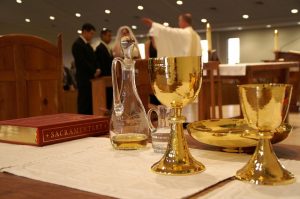
Marriage
The Catholic Church teaches that marriage between two baptized persons is a sacrament. The Old Testament prophets saw the marriage of a man and woman as a symbol of the covenant relationship between God and his people. The permanent and exclusive union between husband and wife mirrors the mutual commitment between God and his people. The Letter to the Ephesians says that this union is a symbol of the relationship between Christ and the Church.
For couples planning to marry in the Catholic Church, please contact the Parish Office six to nine months before your anticipated wedding date to begin the marriage preparation process.
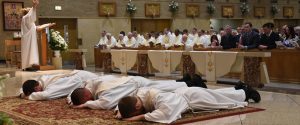
Holy Orders
From the moment of Jesus’ conception in the womb of Mary until his Resurrection, he was filled with the Holy Spirit. In biblical language, he was anointed by the Holy Spirit and thus established by God the Father as our high priest. As Risen Lord, he remains our high priest. . . . While all the baptized share in Christ’s priesthood, the ministerial priesthood shares this through the Sacrament of Holy Orders in a special way.
Ordination to the priesthood is always a call and a gift from God. Christ reminded his Apostles that they needed to ask the Lord of the harvest to send laborers into the harvest. Those who seek priesthood respond generously to God’s call using the words of the prophet, “Here I am, send me” (Is 6:8). This call from God can be recognized and understood from the daily signs that disclose his will to those in charge of discerning the vocation of the candidate.
Please contact the Parish Office for more information.

Anointing of the Sick
In the Church’s Sacrament of Anointing of the Sick, through the ministry of the priest, it is Jesus who touches the sick to heal them from sin – and sometimes even from physical ailment. His cures were signs of the arrival of the Kingdom of God. The core message of his healing tells us of his plan to conquer sin and death by his dying and rising.
The Rite of Anointing tells us there is no need to wait until a person is at the point of death to receive the Sacrament. A careful judgment about the serious nature of the illness is sufficient.
When the Sacrament of Anointing of the Sick is given, the hoped-for effect is that, if it be God’s will, the person be physically healed of illness. But even if there is no physical healing, the primary effect of the Sacrament is a spiritual healing by which the sick person receives the Holy Spirit’s gift of peace and courage to deal with the difficulties that accompany serious illness or the frailty of old age.
Please contact the Parish Office for more information or if you are in need of the Sacrament of the Sick.
